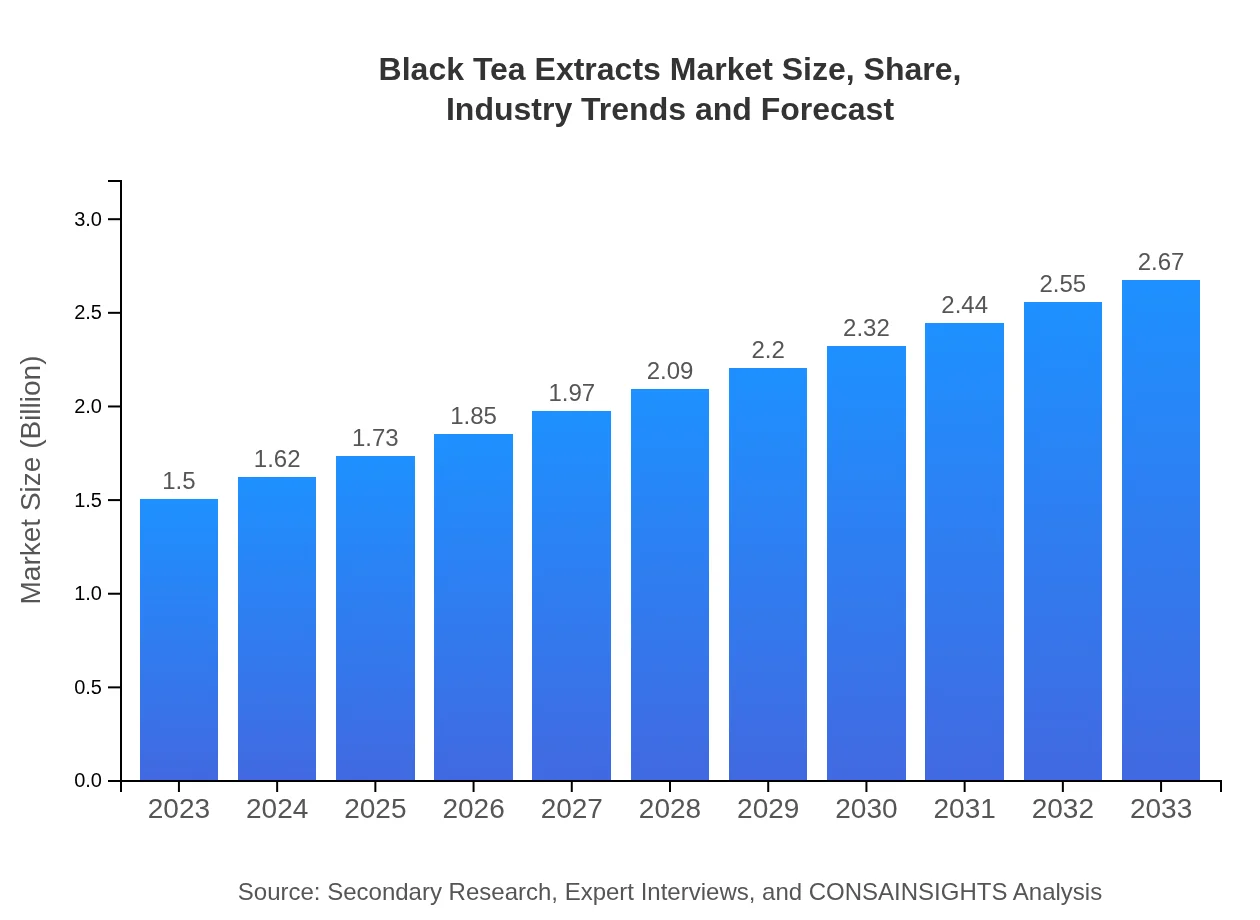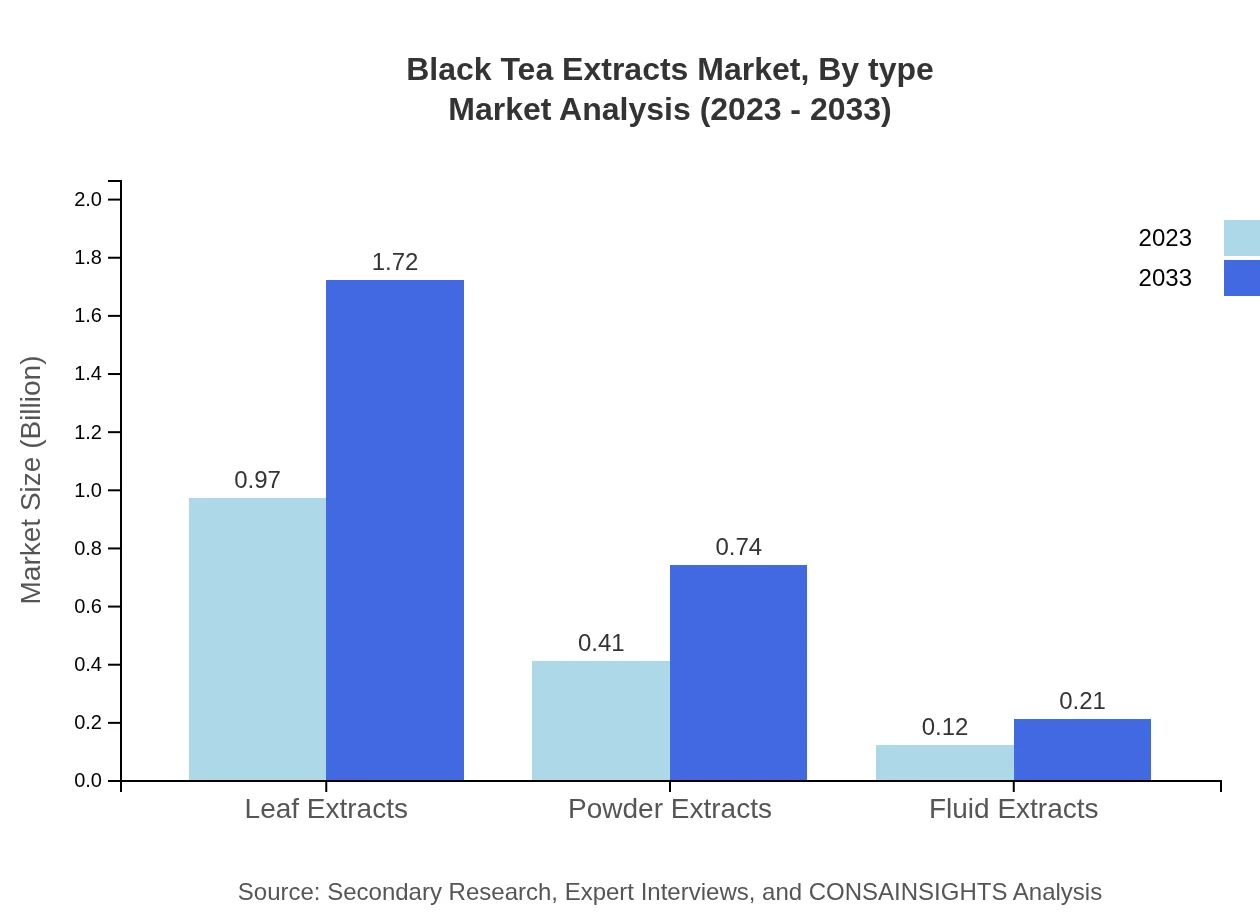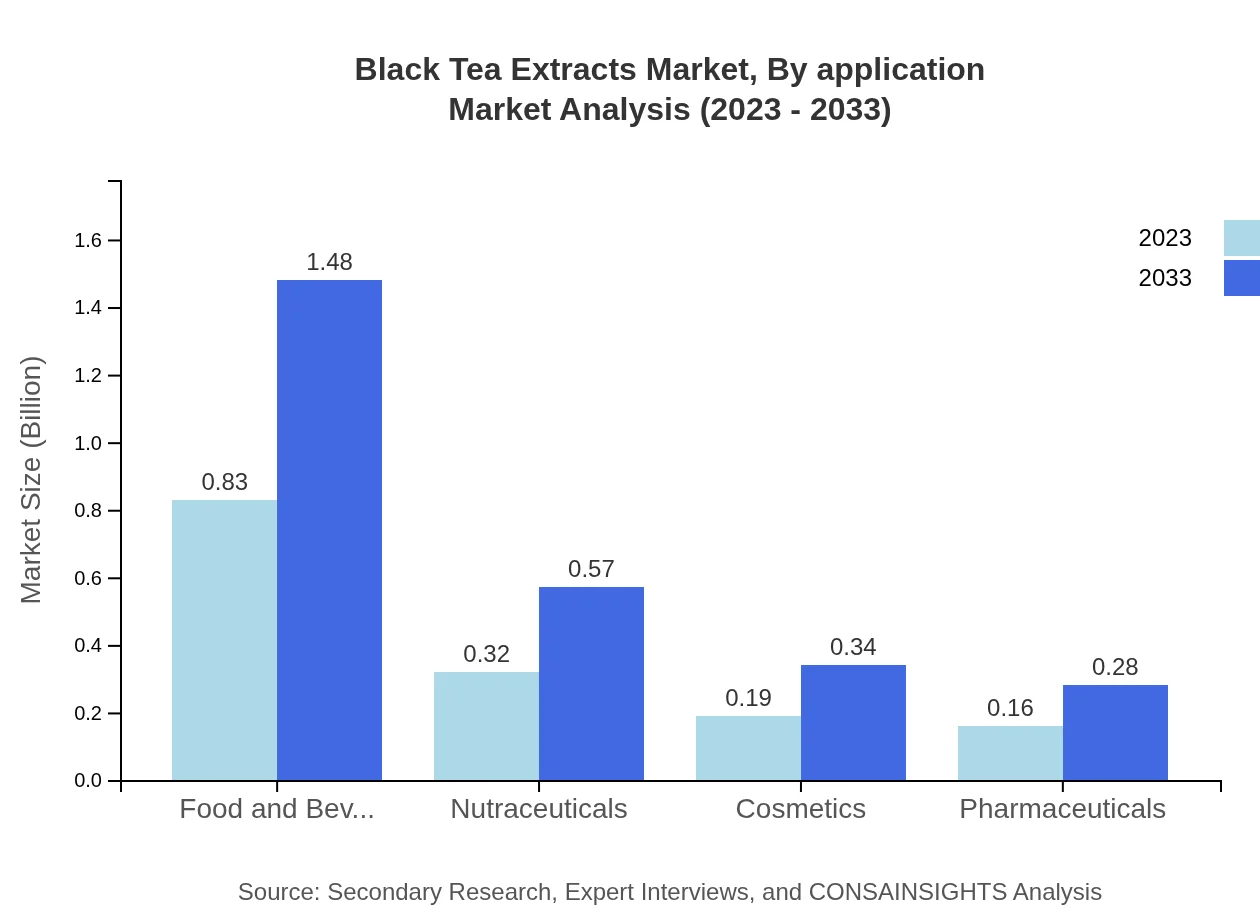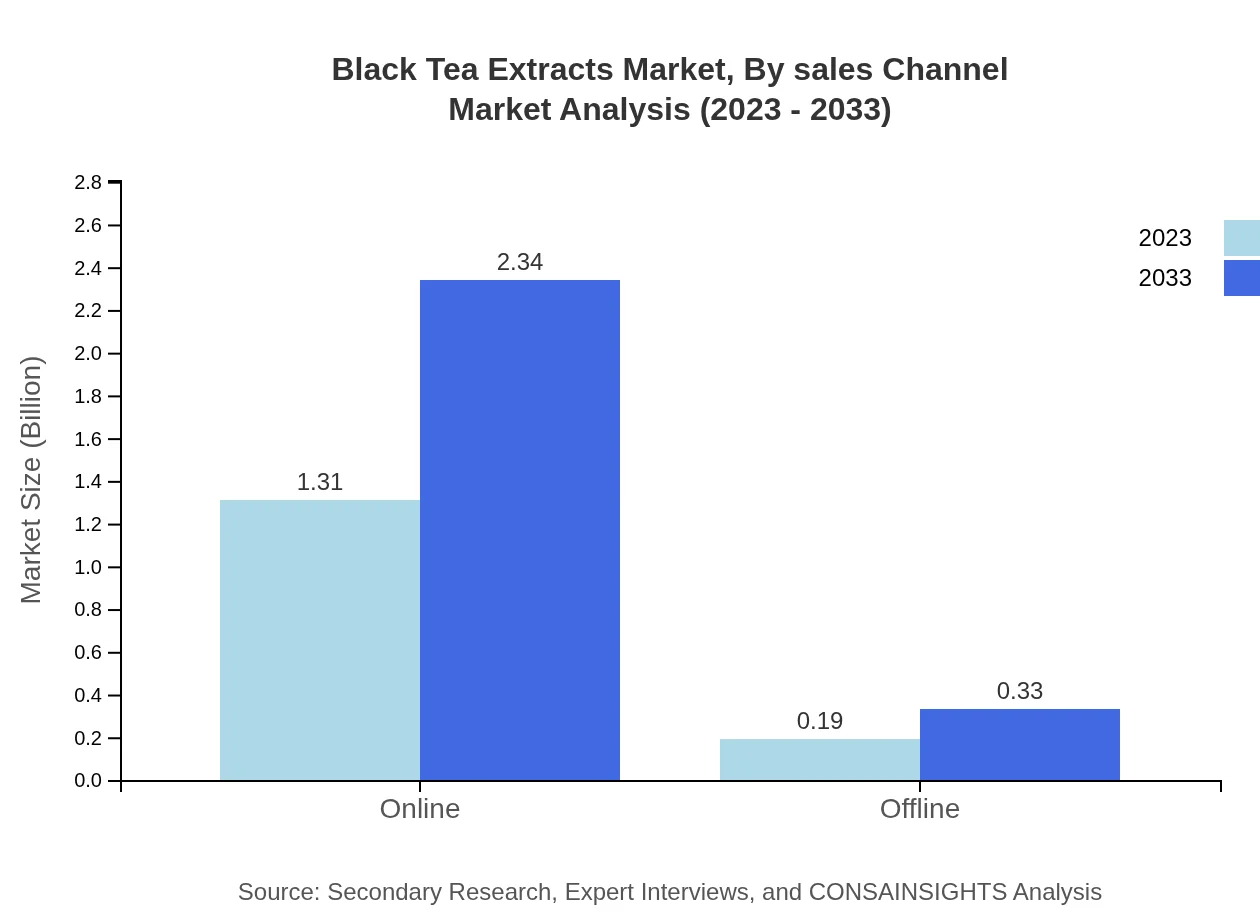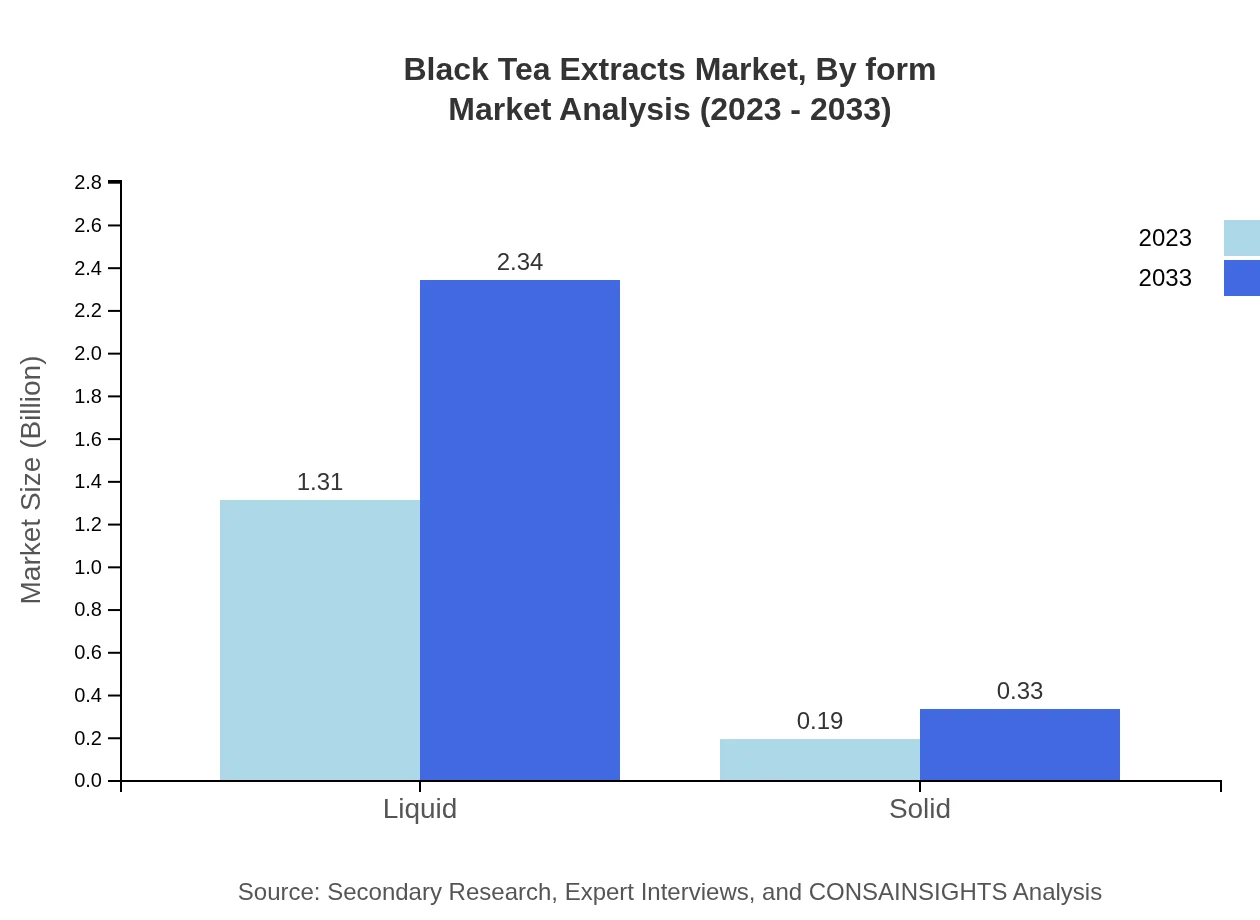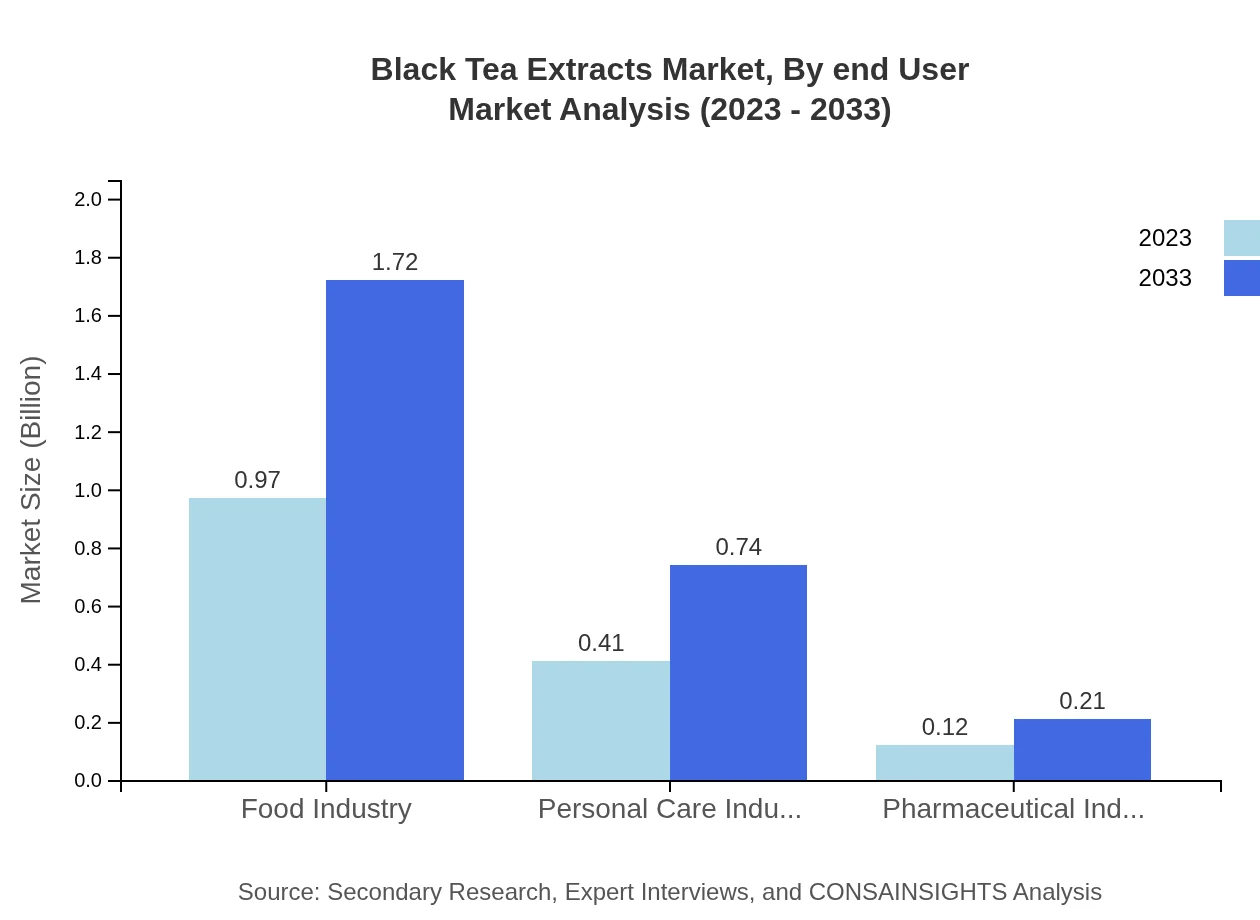Black Tea Extracts Market Report
Published Date: 31 January 2026 | Report Code: black-tea-extracts
Black Tea Extracts Market Size, Share, Industry Trends and Forecast to 2033
This report provides a comprehensive analysis of the Black Tea Extracts market, covering market size estimates, growth forecasts from 2023 to 2033, industry analysis, key trends, and regional insights.
| Metric | Value |
|---|---|
| Study Period | 2023 - 2033 |
| 2023 Market Size | $1.50 Billion |
| CAGR (2023-2033) | 5.8% |
| 2033 Market Size | $2.67 Billion |
| Top Companies | Idaho Botanical Products, The Green Bean Co., Saipro Biotech Private Limited |
| Last Modified Date | 31 January 2026 |
Black Tea Extracts Market Overview
Customize Black Tea Extracts Market Report market research report
- ✔ Get in-depth analysis of Black Tea Extracts market size, growth, and forecasts.
- ✔ Understand Black Tea Extracts's regional dynamics and industry-specific trends.
- ✔ Identify potential applications, end-user demand, and growth segments in Black Tea Extracts
What is the Market Size & CAGR of Black Tea Extracts market in 2023?
Black Tea Extracts Industry Analysis
Black Tea Extracts Market Segmentation and Scope
Tell us your focus area and get a customized research report.
Black Tea Extracts Market Analysis Report by Region
Europe Black Tea Extracts Market Report:
Europe had a market size of around $0.42 billion in 2023, forecast to rise to $0.74 billion by 2033. The rising interest in health and wellness among consumers is contributing to the region's growth.Asia Pacific Black Tea Extracts Market Report:
In the Asia Pacific region, the market size was approximately $0.31 billion in 2023, anticipated to grow to $0.56 billion by 2033. The region's rich history of tea consumption underpins the strong demand for black tea extracts in both culinary and health sectors.North America Black Tea Extracts Market Report:
The North American market, valued at approximately $0.53 billion in 2023, is expected to reach $0.94 billion by 2033. Consumer trends favoring natural and organic products drive demand in the health supplement industry.South America Black Tea Extracts Market Report:
South America's Black Tea Extracts market is projected to increase from $0.05 billion in 2023 to $0.08 billion by 2033. The emerging trend of wellness and natural health products is expected to augment market growth.Middle East & Africa Black Tea Extracts Market Report:
In the Middle East and Africa, the Black Tea Extracts market is projected to grow from $0.20 billion in 2023 to $0.35 billion by 2033. Growing health awareness and the increasing popularity of herbal formats will enhance market potential.Tell us your focus area and get a customized research report.
Black Tea Extracts Market Analysis By Type
The Black Tea Extracts market by type includes liquid, solid, leaf, and powder extracts. Liquid extracts dominated the market with a size of $1.31 billion in 2023, expected to grow to $2.34 billion by 2033. Solid extracts are smaller but significant, growing from $0.19 billion to $0.33 billion over the same period. Leaf extracts also maintain substantial traction, expanding from $0.97 billion to $1.72 billion. Powder extracts, though smaller, are projected to increase from $0.41 billion to $0.74 billion.
Black Tea Extracts Market Analysis By Application
Applications of Black Tea Extracts span various industries, with food and beverages leading at $0.83 billion in 2023, anticipated to rise to $1.48 billion by 2033. The personal care industry is also gaining ground, growing from $0.41 billion to $0.74 billion. Nutraceutical applications are projected to grow from $0.32 billion to $0.57 billion, illustrating strong demand across sectors.
Black Tea Extracts Market Analysis By Sales Channel
The sales channels for Black Tea Extracts include online and offline avenues. Online sales dominate the market, valued at $1.31 billion in 2023 and expected to reach $2.34 billion by 2033. Offline sales, while smaller, are also projected to grow from $0.19 billion to $0.33 billion, catering to traditional retail consumers.
Black Tea Extracts Market Analysis By Form
The forms in which Black Tea Extracts are available—liquid, solid, fluid, and powder—cater to various consumer preferences. Liquid extracts maintain a significant market share, while powders and solids are preferred in specific applications such as culinary uses and health supplements.
Black Tea Extracts Market Analysis By End User
End-users of Black Tea Extracts encompass diverse industries such as pharmaceuticals, food and beverage, cosmetics, and nutraceuticals. Each segment's growth is fueled by changing consumer behaviors favoring healthy and natural products, underscoring the importance of these extracts in the global market.
Black Tea Extracts Market Trends and Future Forecast
Tell us your focus area and get a customized research report.
Global Market Leaders and Top Companies in Black Tea Extracts Industry
Idaho Botanical Products:
Idaho Botanical Products specializes in providing premium quality botanical extracts, focusing heavily on sustainable and natural ingredients to meet growing consumer demands.The Green Bean Co.:
The Green Bean Co. is a leader in herbal extracts and tea solutions, known for its research and development efforts to enhance product efficacy and applications across sectors.Saipro Biotech Private Limited:
Saipro Biotech is renowned for its extensive range of natural extracts and is committed to delivering organic tea extracts tailored to the nutritional and health needs of consumers.We're grateful to work with incredible clients.









FAQs
What is the market size of black tea extracts?
As of 2023, the global black tea extracts market size is estimated at $1.5 billion. It is projected to grow at a compound annual growth rate (CAGR) of 5.8% through 2033, reflecting a sustained demand in various industries.
What are the key market players or companies in the black tea extracts industry?
Key players in the black tea extracts market include leading beverage corporations, health supplement manufacturers, and cosmetic companies. These companies are leveraging innovation and sustainability to enhance their product offerings in the black tea category.
What are the primary factors driving the growth in the black tea extracts industry?
The growth of the black tea extracts industry is driven by increasing consumer awareness of health benefits, rising demand in the food and beverage sector, and the trend towards natural ingredients in personal care products, boosting consumption.
Which region is the fastest Growing in the black tea extracts market?
The fastest-growing region for black tea extracts is projected to be North America, with a market size of $0.53 billion in 2023, expected to reach $0.94 billion by 2033. This demonstrates robust growth potential in the region.
Does ConsaInsights provide customized market report data for the black tea extracts industry?
Yes, ConsaInsights offers customized market report data tailored to specific requirements in the black tea extracts industry. Clients can request detailed insights that align with their strategic needs for optimal decision-making.
What deliverables can I expect from this black tea extracts market research project?
Deliverables from the black tea extracts market research project include comprehensive market analysis reports, trend forecasts, competitive landscape overviews, and segmented data insights across various regions and product types.
What are the market trends of black tea extracts?
Current trends in the black tea extracts market include the growing preference for organic and sustainably sourced products, increased use in nutraceuticals and wellness beverages, and innovation in product formulations targeting health-conscious consumers.

